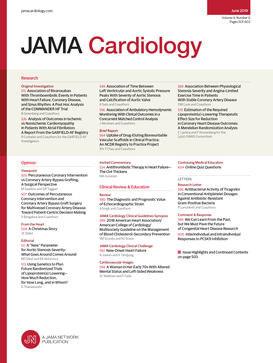Interpreting Population Mean Treatment Effects in the Kansas City Cardiomyopathy Questionnaire
IF 14.8
1区 医学
Q1 CARDIAC & CARDIOVASCULAR SYSTEMS
引用次数: 0
Abstract
ImportanceThe Kansas City Cardiomyopathy Questionnaire (KCCQ) is a commonly used outcome in heart failure trials. While comparing means between treatment groups improves statistical power, mean treatment effects do not necessarily reflect the clinical benefit experienced by individual patients.ObjectiveTo evaluate the association between mean KCCQ treatment effects and the proportions of patients experiencing clinically important improvements across a range of clinical trials and heart failure etiologies.Design, Setting, and ParticipantsA patient-level analysis of 11 randomized clinical trials, including 9977 patients, was performed to examine the association between mean treatment effects and the KCCQ Overall Summary Score (OSS) and the absolute differences in the proportions of patients experiencing clinically important (≥5 points) and moderate to large (≥10 points) improvements. There was no target date range, and included studies were those for which patient-level data were available. Validation was performed in 7 additional trials. The data were analyzed between July 1 and September 15, 2023.Main Outcomes and MeasuresProportion of patients experiencing an improvement of 5 or more and 10 or more points in their KCCQ score (with each domain transformed to a range of 0 to 100 points, where higher scores represent better health status).ResultsGroup mean KCCQ-OSS differences were strongly correlated with absolute differences in clinically important changes (Spearman correlations 0.76-0.92). For example, a mean KCCQ-OSS treatment effect of 2.5 points (half of a minimally important difference for an individual patient) was associated with an absolute difference of 6.0% (95% prediction interval [PI], 4.0%-8.1%) in the proportion of patients improving 5 or more points and 5.0% (95% PI, 3.1%-7.0%) in the proportion improving 10 or more points, corresponding to a number needed to treat of 17 (95% PI, 12-25) and 20 (95% PI, 14-33), respectively.Conclusions and RelevanceInferences about clinical impacts based on population-level mean treatment effects may be misleading, since even small between-group differences may reflect clinically important treatment benefits for individual patients. Results of this study suggest that clinical trials should explicitly describe the distributions of KCCQ change at the patient level within treatment groups to support the clinical interpretation of their results.堪萨斯城心肌病问卷中人群平均治疗效果的解读
重要性堪萨斯城心肌病问卷(KCCQ)是心力衰竭试验中常用的结果。虽然比较治疗组间的平均值可提高统计能力,但平均治疗效果并不一定能反映个体患者的临床获益。目的评估在一系列临床试验和心衰病因中,KCCQ 平均治疗效果与临床上有重要改善的患者比例之间的关系。设计、设置和参与者对包括9977名患者在内的11项随机临床试验进行了患者层面的分析,以研究平均治疗效果与KCCQ总体综合评分(OSS)之间的关系,以及临床重要改善(≥5分)和中度至大幅改善(≥10分)患者比例的绝对差异。没有目标日期范围,纳入的研究均为可获得患者水平数据的研究。另外还对 7 项试验进行了验证。主要结果和测量KCCQ评分改善5分或以上和10分或以上的患者比例(每个域转换为0到100分的范围,分数越高代表健康状况越好)。结果组平均KCCQ-OSS差异与临床重要变化的绝对差异密切相关(Spearman相关性为0.76-0.92)。例如,平均 2.5 分的 KCCQ-OSS 治疗效果(单个患者最小重要差异的一半)与改善 5 分或更多的患者比例的绝对差异 6.0%(95% 预测区间 [PI],4.0%-8.1%)和改善 10 分或更多的患者比例的绝对差异 5.0%(95% 预测区间 [PI],3.1%-7.0%)相关。结论与相关性基于人群水平的平均治疗效果来推断临床影响可能会产生误导,因为即使是很小的组间差异也可能反映出个别患者具有重要的临床治疗获益。本研究结果表明,临床试验应明确描述治疗组内患者水平的 KCCQ 变化分布,以支持对其结果的临床解释。
本文章由计算机程序翻译,如有差异,请以英文原文为准。
求助全文
约1分钟内获得全文
求助全文
来源期刊

JAMA cardiology
Medicine-Cardiology and Cardiovascular Medicine
CiteScore
45.80
自引率
1.70%
发文量
264
期刊介绍:
JAMA Cardiology, an international peer-reviewed journal, serves as the premier publication for clinical investigators, clinicians, and trainees in cardiovascular medicine worldwide. As a member of the JAMA Network, it aligns with a consortium of peer-reviewed general medical and specialty publications.
Published online weekly, every Wednesday, and in 12 print/online issues annually, JAMA Cardiology attracts over 4.3 million annual article views and downloads. Research articles become freely accessible online 12 months post-publication without any author fees. Moreover, the online version is readily accessible to institutions in developing countries through the World Health Organization's HINARI program.
Positioned at the intersection of clinical investigation, actionable clinical science, and clinical practice, JAMA Cardiology prioritizes traditional and evolving cardiovascular medicine, alongside evidence-based health policy. It places particular emphasis on health equity, especially when grounded in original science, as a top editorial priority.
 求助内容:
求助内容: 应助结果提醒方式:
应助结果提醒方式:


